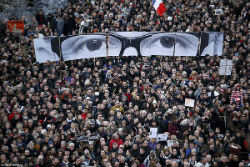As we try to process the most recent display of the frighteningly dark capabilities of the human soul, my question is to us – the sign holders, the stand-in-solidarity vigil participants, the pens-in-the-air freedom fighters.
Are you…am I…really Charlie?

I’m reminded in this moment of a corollary to the “be careful what you wish for” axiom. The version we need to consider going forward is “be careful who you wish to be.” The following widely circulated quote from Charlie Hedbo editor Stéphane Charbonnier (in this 2012 Le Monde interview) has kicked around relentlessly in my head for the past week:
“I have no kids, no wife, no car , no credit. That may be a bit pompous what I am saying , but I prefer to die standing than live on my knees.”
It’s not that this is a new statement. Tough talk like this can be heard by politicians, rappers, and movie gangsters on a routine basis. As with most bold statements, few people who make them are “really about that life.” It appears that the men and women of Charlie Hedbo were among that few…for better or worse.
“I have no kids, no wife”
On one level, this is a statement of fact. Mr. Charbonnier was apparently a household of one. The true power of this statement appears, however, when we understand it as a declaration of independence from all close, love-melded, interpersonal ties to family members.
It’s like the person in a superhero movie who can’t be baited with a loved one trapped as a hostage by the villain. On one hand, there are benefits to operating with the emotional and mental freedom that comes from not having to concern one’s self with protecting and defending a family. Yet I wonder how many of us have – or wish to have – such a life. How many of us would be truly content to entrust the substance of our life and legacy to colleagues, friends, and strangers?
“No car, no credit”
This declaration, without the backing of sizable financial assets, is a profound statement from someone living in a high-cost, global wealth-infused city like Paris. This is a 1% claim on a 99% budget.
Chances are you don’t have – or want – this life either. The poet Nikki Giovanni said, ‘you can’t afford debt when you’re an artist.’ Many artists hold fast to that tradition to this day, and fight the relentless wave of commercial marketing and societal judgments that dictate how most of us spend our money.
How many of us in Western countries are willing to restructure our lives to achieve this level of freedom from our connections to our material possessions?
“I prefer to die standing than live on my knees.”
This is the foreboding challenge Mr. Charbonnier delivered to his haters…and to his supporters. There is always a segment of any population that prefers to die. These folks are usually viewed with a mixture of suspicion, fear, and/or pity.
‘To die standing’ is a distinction usually reserved for our protectors…soldiers, police officers, etc. Some of us may have to put on the cape and save the day to defend our home or our kids, but that’s not the same as assuming such a posture as the default setting for your life.
‘Living on our knees’ is the clause that gives me the most pause (rhyme intended). It is to exist in a position of submission. It is to acknowledge your relative powerlessness. It is to choose Flight over Fight.
This is not how we like to think of ourselves in the West. In America, it’s almost blasphemy to even entertain the thought. Yet, whether it’s by living check-to-check…by not wanting to rock the boat…by trusting the “experts”…or by questioning the weak before judging the strong…too many of us are indeed living on our knees.
I’m not seeking to demean anyone’s struggle…or my own. However, if we’re going to stand together in solidarity, we owe it to ourselves (and to the memory of the courageous people who stepped out before us), to wrestle with the words of those we hold up after we lay them to rest.
– Day G.
Host, Class of Hope & Change